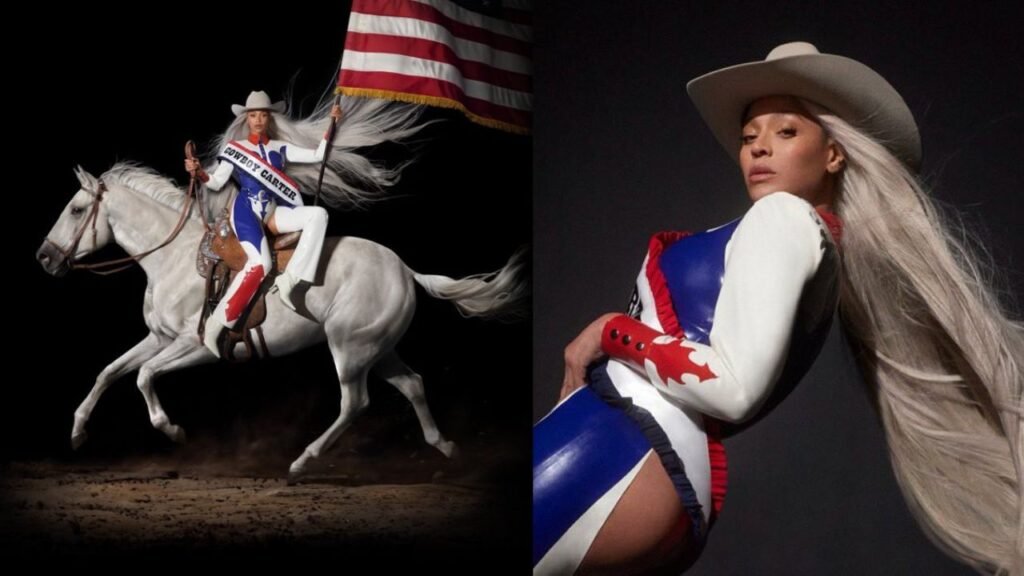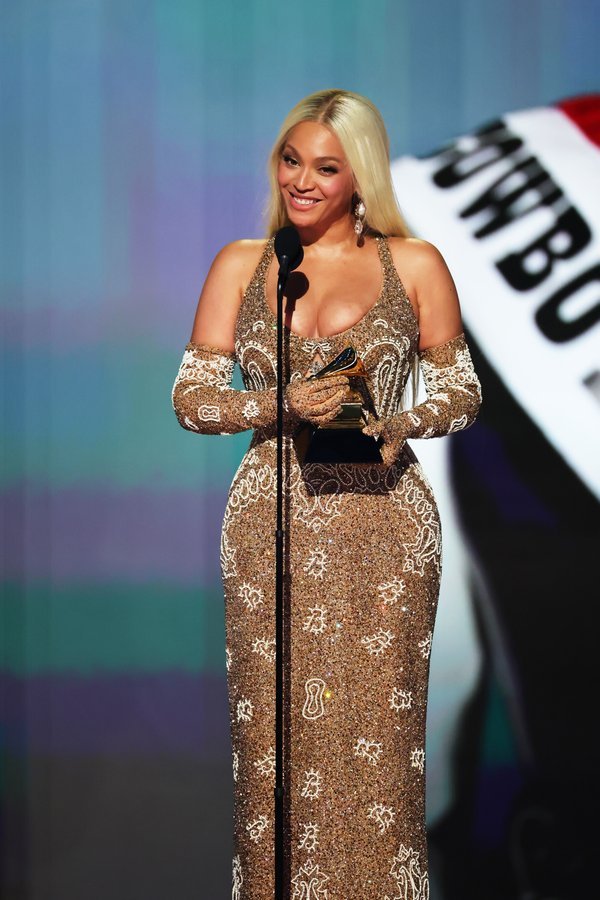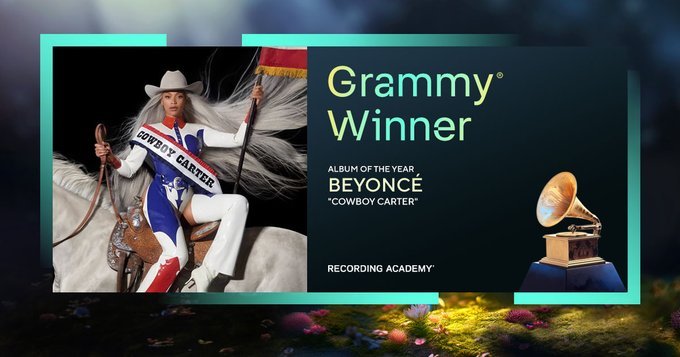Beyoncé’s Cowboy Carter Rides To Victory: The 2025 Grammys’ Most Powerful Moments
- Leave a Comment
- James M
- February 3, 2025

Music, culture, and tenacity came together in ways that will never be forgotten at the 2025 Grammy Awards. With its historic victories, heartfelt tributes, and audacious remarks that had an impact well beyond the stage, this year’s ceremony was more than just a celebration of the greatest music of all time.
The evening was a monument to the transformational power of art, ranging from poignant recognitions of societal difficulties to groundbreaking accomplishments by great artists.
Beyoncé’s long-awaited victory, winning Album of the Year for Cowboy Carter, was the highlight of the evening and cemented her place among the greatest musicians of all time. Her victory broke down boundaries for Black women in a field that has frequently undervalued their efforts, making it more than just a personal achievement.
In addition to her, the night’s message of advancement and responsibility was emphasized by Kendrick Lamar’s double win for Not Like Us and Chappell Roan’s passionate statement as Best New Artist.
The tenacity of Los Angeles, a city still recovering from the effects of devastating wildfires, was also honored at the 2025 Grammy Awards. Through speeches, performances, and fundraising activities, the show celebrated the music that has long been the community’s lifeblood while also honoring its strength.
The evening was a love letter to the city and its residents, from Billie Eilish’s moving performance to the opening act’s cover of I Love L.A.
However, the 2025 Grammys were notable for their unwavering acceptance of change, which went beyond the sparkle and splendor. The winners pushed for greater diversity and inclusion, questioned industry conventions, and supported underrepresented populations using their platforms.
The Grammys served as a reminder that music has the ability to inspire, bring people together, and propel significant change in a society that is frequently divided. This was a celebration of artistry, tenacity, and the timeless influence of music on our lives, not merely an awards ceremony.

Beyoncé's Record-Setting Album of the Year Award
Decades of preparation went for Beyoncé’s 2025 Grammy victory for Cowboy Carter, which was a momentous moment for the music business overall as well as for herself. She had previously received four nominations for Album of the Year, so her victory felt like a long-overdue recognition of her unmatched talent and impact.
Her capacity to push limits and reimagine what music may be was demonstrated by Cowboy Carter, a genre-defying classic that combines country, R&B, and soul. This victory was a celebration of Beyoncé’s unwavering inventiveness and her capacity to engage audiences of all ages and musical tastes, not just the album itself.
The fact that Beyoncé was the first Black woman to win Album of the Year in the twenty-first century added even more significance to this triumph. This is a unique and significant occasion because Lauryn Hill was the last Black woman to get this distinction in 1999 with The Miseducation of Lauryn Hill.
Beyoncé’s victory brought attention to the structural obstacles Black women still encounter in the music business, where their efforts are frequently honored in specialized categories but disregarded for the major awards. In addition to solidifying her legacy, Beyoncé cleared the path for upcoming generations of Black women musicians to be acknowledged on the greatest stages by ending this 26-year drought.
Beyoncé honored Linda Martell, the first Black woman to perform at the Grand Ole Opry, in her acceptance speech, recognizing the trailblazers who helped make her a success. Speaking openly about genre’s restrictions, she described it as “a cold word to keep us in our place as artists.”
Cowboy Carter, who combined country inspirations with Beyoncé’s distinctive voice, broke conventional genre categories, therefore this comment struck a deep chord. Her remarks served as a reminder that true creativity comes from letting go of preconceived notions and that artistic expression shouldn’t be limited by artificial borders.
Beyoncé’s victory was a cultural event that highlighted the continued hardships and victories of Black women in the music business, in addition to being a personal accomplishment. Because of the prejudices that still persist in the industry, she has frequently been passed over for the highest prizes even though she is the most decorated performer in Grammy history.
Her win for Cowboy Carter served as a potent reminder of the value of representation and the necessity of structural reform. Beyoncé’s legacy is both an inspiration and a call to action, reminding us that the struggle for recognition and equity is far from over as she continues to reshape what it means to be an artist.
Join us as we continue to celebrate the life and career of Quincy Jones at the 67th #GRAMMYs with @laineywilson and @jacobcollier's special rendition of "Let The Good Times Roll.” 🎤 pic.twitter.com/mJmFyqWmwF
— Recording Academy / GRAMMYs (@RecordingAcad) February 3, 2025
Kendrick Lamar's Two Victories
One of the highlights of the 2025 Grammy Awards was Kendrick Lamar’s performance, as he won both Song of the Year and Record of the Year for his hit song “Not Like Us.” The victories demonstrated Lamar’s unmatched talent as a storyteller and lyricist, as well as his capacity to produce music that speaks to people on a profoundly social and personal level.
Lamar’s status as one of the most significant voices in hip-hop was cemented when his impassioned diss tune, “Not Like Us,” which also serves as a statement on loyalty and betrayal, resonated with both audiences and critics.
The rarity of hip-hop victories in these categories added to the significance of Lamar’s triumphs. Only a few hip-hop songs have ever won Song or Record of the Year since the Grammys started, with Childish Gambino’s 2019 song “This Is America” being the most recent to do so.
Lamar’s victories set a new standard for the genre, emphasizing both its increasing impact and the need for further acknowledgment in traditional award presentations. His popularity served as a reminder that hip-hop is a cultural force that influences and reflects the world we live in, not merely a genre.
During his acceptance speech, Lamar praised Compton, Watts, and Inglewood and dedicated his honors to the city of Los Angeles. He acknowledged the communities that have influenced his identity and artistic expression by saying, “This is for the city that raised me.”
His remarks were a potent ode to the tenacity and inventiveness of the streets of Los Angeles, which have long served as an inspiration for his songs. By honoring his heritage, Lamar served as a reminder that his achievement is a reflection of his community’s strength as a whole, not just of himself.
Lamar’s dual victory was a win for hip-hop and the communities it represents, not just a celebration of his artistic abilities. Not Like Us became an anthem of defiance and unity during a year full of difficulties and upheaval, and it resonated with audiences outside the music industry.
Lamar’s victories at the 2025 Grammys serve as a reminder of the ability of music to uplift, inspire, and provoke while he continues to push boundaries and break conventions. This was a time of affirmation and promise for both hip-hop artists and fans, demonstrating that the genre’s influence is obvious and that its future is more promising than ever.
Following the horrific wildfires that started on January 7, the 67th Annual Grammy Awards event, which took place on February 2, 2025, gave a touching tribute to Los Angeles.
A moving performance of Randy Newman’s “I Love L.A.” by a supergroup consisting of Dawes, Brittany Howard, St. Vincent, Brad Paisley, John Legend, and Sheryl Crow kicked off the concert. This performance honored the city and its residents while fostering a spirit of solidarity and resiliency.
In his opening speech, host Trevor Noah, who has hosted the Grammys for five years running, recognized the significant effects of the wildfires on the people of Los Angeles.
“The darkest of times show the best in humanity,” he said, highlighting the fortitude and camaraderie of the locals and first responders. Noah also emphasized how the music business can help with relief efforts and urged donations to help people impacted by the tragedy.
The Recording Academy announced the Los Angeles Fire Relief Effort and pledged an initial $1 million as a major show of support. With the help of attendance’ and viewers’ donations, the project was able to raise more than $7 million to help those affected by the fires.
This significant amount demonstrates the music community’s shared dedication to helping the city rebuild and providing support to the impacted citizens.
Artists from Los Angeles were essential to the tributes that night. In a heartfelt rendition of “Birds of a Feather,” Billie Eilish and her brother Finneas dedicated the song to their community.
Expressing her strong bond with the city, Eilish declared, “I love you, LA.” The audience responded favorably to this sincere tribute, which captured the community’s resilient spirit and individual losses.
Can’t get enough of @JanelleMonae’s tribute to the late great @QuincyDJones. ❤️ #GRAMMYs pic.twitter.com/jIIzlo5xHB
— Recording Academy / GRAMMYs (@RecordingAcad) February 3, 2025
In recognition of her extraordinary talent and tenacity in the music business, Chappell Roan received the Best New Artist award at the 2025 Grammy Awards.
Roan took use of the opportunity to push for structural reforms in the industry during her acceptance speech, highlighting the need for record labels to give up-and-coming musicians livable pay and access to healthcare. “Labels, we got you but do you got us?” she asked the influential people in the industry, posing a pertinent question.
Roan’s own experiences served as the foundation for her call to action. Signed as a minor, she encountered many obstacles once her label dismissed her, such as trouble finding work and paying for health insurance during the pandemic.
These difficulties brought to light the vulnerable situation that many up-and-coming artists find themselves in, as they manage their careers without the support and safeguards they need.
Her experience serves as a reminder of the larger structural problems in the music business, where up-and-coming musicians frequently function without support.
Roan’s campaign highlights the necessity of structural changes to guarantee that artists receive fair treatment and necessary benefits. By telling her story, she not only demonstrated her own fortitude but also the fortitude needed by many artists who encounter comparable difficulties.
Roan’s speech had a profound effect on the audience, igniting discussions on record companies’ obligations and the value of assisting artists in ways other than their artistic output.
Her openness and bravery in tackling these problems could spur change by motivating business executives to reconsider their procedures and give the welfare of the artists who fuel their success top priority.
After a four-year boycott, The Weeknd makes an unexpected comeback to the stage at the 2025 Grammy Awards. With Playboi Carti and a vibrant group of red-clad dancers, he performed a mesmerizing rendition of “Cry for Me” off his most recent album, Hurry Up Tomorrow, after being introduced by Recording Academy CEO Harvey Mason Jr. A possible reconciliation between the artist and the Recording Academy was hinted at by this unexpected appearance, which was the evening’s high point.
Following the lack of nominations for his critically praised album After Hours in 2021, The Weeknd declared the Recording Academy to be “corrupt” and stopped submitting his music for consideration, which marked the beginning of his hiatus from the Grammys.
His 2025 return points to a potential lessening of hostilities and his possible recognition of the Academy’s recent reforms meant to improve the nomination process’s impartiality and transparency.
To address previous critiques, the Recording Academy has made considerable reforms under the direction of CEO Harvey Mason Jr. To better reflect the state of music today, these reforms include broadening the voting membership and doing away with anonymous nominating panels.
Mason has highlighted the significance of diversity, noting that more than 3,000 women have been added as voting members and that persons of color now make up about 40% of the Academy’s voting membership.
In addition to demonstrating the effects of these changes, The Weeknd’s comeback to the Grammy stage also demonstrates how the relationship between musicians and the Recording Academy has changed over time.
His performance offered a promising future for musicians and the organization, demonstrating the strides made in creating a more open and transparent atmosphere inside the music business.

On February 2, 2025, the 67th Annual Grammy Awards featured a number of outstanding performances and tributes that made an effect on viewers. The Best New Artist award winner, Chappell Roan, performed a powerful version of her breakthrough single, “Pink Pony Club.”
With upbeat choreography and a brilliant stage design that turned the arena into a bustling club, her performance was a colorful celebration of LGBTQ+ culture. In addition to showcasing her creative abilities, this performance demonstrated her dedication to diversity and representation in the music business.
Another highlight of the evening was a moving homage to the great Quincy Jones. Artists like Cynthia Erivo and Janelle Monáe gave exceptional performances in the segment, which included a medley of Jones’s most well-known productions.
With her dramatic vocals and dancing, Monáe’s performance of “Don’t Stop ‘Til You Get Enough” honored Michael Jackson’s iconic hit while encapsulating Jackson’s style. A stirring group rendition of “We Are the World,” which represented solidarity and the lasting influence of Jones’s musical achievements, marked the tribute’s conclusion.
The Beatles achieved a historic Grammy victory with their song “Now and Then,” which stands out for its creative application of artificial intelligence technology. The song was created by using artificial intelligence (AI) to isolate and recover John Lennon’s voice from a demo tape from the 1970s.
This accomplishment not only honored The Beatles’ lasting legacy but also brought attention to the changing relationship between technology and music production, sparking conversations about the potential applications of artificial intelligence in the field going forward.
Other noteworthy events from the evening included Janelle Monáe’s incredible Michael Jackson tribute performance. Monáe showcased her versatility as an artist by adopting Jackson’s unique flair and delivering a performance that was both nostalgic and refreshingly modern. Her reputation as a powerful force in contemporary music was further cemented when her performance was praised for its precision and vigor.
As a reflection of the music industry’s involvement with wider societal issues, a number of Grammy Award winners used their acceptance speeches at the 67th Annual Grammy Awards on February 2, 2025, to address important social and political topics.
After winning Best Pop Duo/Group Performance, Lady Gaga gave a moving speech supporting the transgender population. “Trans people are not invisible,” she underlined, calling for increased awareness and assistance, particularly in view of recent political initiatives that have impacted transgender rights.
After receiving the Dr. Dre Global Impact Award, Alicia Keys gave a powerful statement about the importance of diversity, equity, and inclusion (DEI). “DEI is not a threat, it’s a gift,” she said, refuting recent claims that DEI programs are dangerous. Keys urged for ongoing compassion and empathy while highlighting the power that many voices offer to the music business.
The musicians’ dedication to using their platforms to support underrepresented groups and advance diversity both inside and outside of the music industry is demonstrated by their speeches.
Conclusion:
The 2025 Grammy Awards served as a potent illustration of the music industry’s continuous development in addition to being a night of joy. The ceremony, which featured passionate speeches and historic victories, demonstrated the power of music to bring people together, the tenacity of musicians, and the advancements made in the direction of inclusivity.
The event celebrated both well-known icons and up-and-coming artists, reaffirming that music is a tool for social and cultural change in addition to being a form of entertainment.
Recognizing and elevating underrepresented voices was one of the evening’s main themes. Alicia Keys defended the significance of DEI efforts, Lady Gaga utilized her voice to support the transgender community, and Chappell Roan demanded equitable pay and healthcare for musicians.
These incidents demonstrated the industry’s growing realization that real development necessitates not only praising talent but also pushing for significant structural reform.
The ability of music to influence discussions outside of the stage is also evolving. Artists are not only storytellers, but also changemakers, as the 2025 Grammys showed. They use their positions to confront inequalities and advocate for a more egalitarian industry.
Whether it was Shakira’s homage to immigrants, The Beatles’ inventive use of artificial intelligence, or Beyoncé’s ground-breaking Cowboy Carter, the event demonstrated how closely music is still entwined with contemporary cultural and political movements.
The future of music is more promising and inclusive than it has ever been. Every voice, every song, and every note has the capacity to motivate change, as the Grammys reminded us.
The industry is heading toward a future where all artists, regardless of background, receive the respect, support, and recognition they deserve, if this year’s event is any guide.
